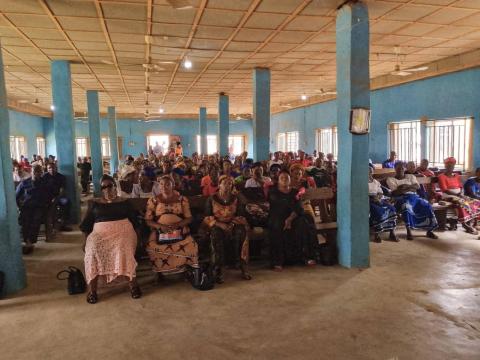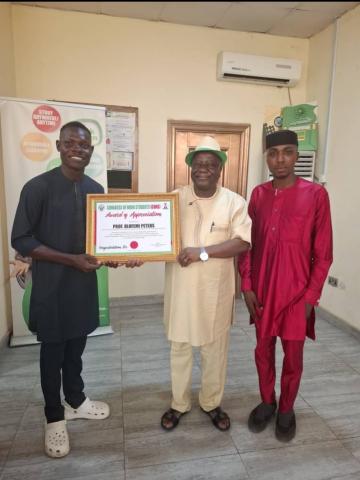Abuja, Nigeria – Minister of Innovation, Science and Technology, Chief Uche Geoffrey Nnaji, has issued a strong call to action, urging a nationwide embrace of Artificial Intelligence (AI) in research aimed at tackling pressing sustainability challenges. The Minister’s appeal comes amidst growing recognition of AI's transformative potential across various sectors.
Highlighting Nigeria's growing role in the continental AI landscape, Nnaji revealed that over 200,000 citizens are actively engaged in the Commonwealth AI Academy Initiative. Their participation, he noted, is instrumental in contributing to data-driven environmental and developmental programs, solidifying Nigeria's position as a leader in AI innovation within Africa.
The Minister's remarks were delivered during the opening ceremony of the 10th Annual Symposium of the American Chemical Society (ACS) Nigeria International Chemical Sciences Chapter, held on Monday, May 5, 2025, at the National Open University of Nigeria (NOUN) headquarters in Abuja.
Representing Minister Nnaji, his Special Adviser, Engr. (Dr.) Patrick Oghuma, emphasized the symposium's theme, “Advancing Sustainability Through AI-Driven Chemistry,” as reflecting the critical need to integrate AI into chemical sciences to address complex real-world issues and safeguard the nation's future.
Dr. Oghuma conveyed the Minister's assertion that sustainable development hinges on the implementation of bold, AI-driven scientific solutions. He challenged chemists, particularly emerging scientists, to prioritize research that is solution-oriented, nationally relevant, and possesses global impact.
Minister Nnaji also voiced concerns about the persistent disconnect between research findings and their practical application. He lamented that numerous valuable scientific contributions remain confined to academic publications, failing to reach industries or policymakers who could translate them into tangible benefits.
Acknowledging AI's immense capabilities, the Minister pointed out that machine learning can now accurately predict molecular characteristics, expedite the discovery of new materials, and identify environmentally friendly chemical alternatives. He cited advancements in biodegradable materials, safer chemical processes, and advanced energy storage technologies as examples of AI's revolutionary impact on chemistry.
In a direct message to young Nigerian chemists, Nnaji implored them to “reject mediocrity and embrace discipline and excellence.” He emphasized that socioeconomic circumstances should not be a barrier to achievement, stating that “geography, poverty, or lack of resources are not acceptable excuses, because some of the greatest breakthroughs have emerged from modest environments.”
Speaking on behalf of Vice-Chancellor Prof. Olufemi Peters, the Deputy Vice Chancellor (Academic), Prof. Chiedu Mafiana, expressed NOUN's enthusiasm in hosting the significant symposium.
He commended the ACS Nigeria Chapter for its decade-long commitment to scientific excellence and its success in creating a platform that effectively connects academia, industry, and policy-making bodies.
Professor Peters underscored the transformative power of AI in revolutionizing chemical processes, citing its ability to predict, model, and optimize for improved efficiency, reduced energy consumption, and minimal waste. He described AI as "a frontier force" driving sustainable innovations in the field of chemistry.
“At NOUN, we are deeply committed to the ideals of accessible, technology-enhanced education and pertinent researches that address national development and global goals,” he added.
The VC, a professor of chemistry, urged participants to actively engage in the symposium's sessions, which covered topics ranging from AI-enhanced brain chemistry to sustainable cement manufacturing. He emphasized the potential for knowledge gained during the symposium to catalyze real-world change.
Delivering the keynote address, Dr. Abdullahi Mustapha, Director-General and CEO of the Energy Commission of Nigeria, represented by Dr. Shehu S. Mustapha, Acting Director of Energy Transition and Linkages, illustrated the increasingly vital role of AI as an ally to chemists.
While celebrating the potential of AI-powered chemistry, Dr. Mustapha acknowledged significant challenges facing researchers in Nigeria, including data scarcity, limited AI literacy, and inadequate digital infrastructure.
“AI systems are only as good as the data they are trained on, so we must invest in generating high-quality, context-specific datasets and equip chemists with the skills to work across computational and experimental domains,” he stressed.
Earlier, in her welcome address, Prof. Edu, chairperson of ACS Nigeria, described the symposium as a "premier gathering of chemists, researchers, professionals, industrialists, and policy makers" and a celebration of 10 years of shared commitment toward scientific excellence and global sustainability.
She emphasized the relevance of this year's theme, noting that as the world grapples with climate change, energy insecurity, and resource depletion, chemistry offers crucial solutions, and artificial intelligence now provides a powerful toolkit for accelerated discovery and intelligent design.
She expressed gratitude to NOUN for its ongoing support, highlighting Prof. Peters as a key supporter of the society, which led to the award given to him for his contributions to open and distance learning and chemistry education, research, and practice globally.




Share your thoughts about this post